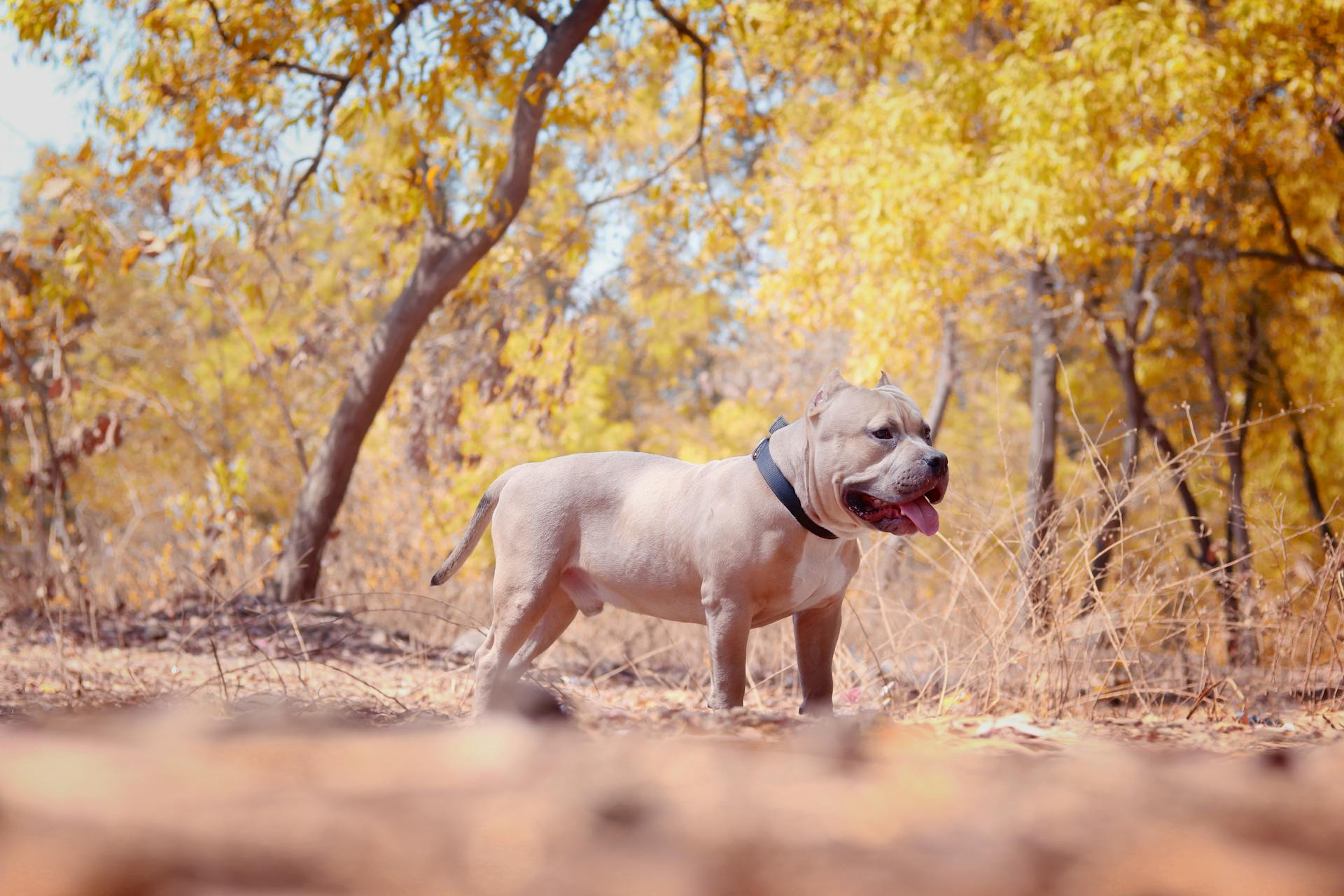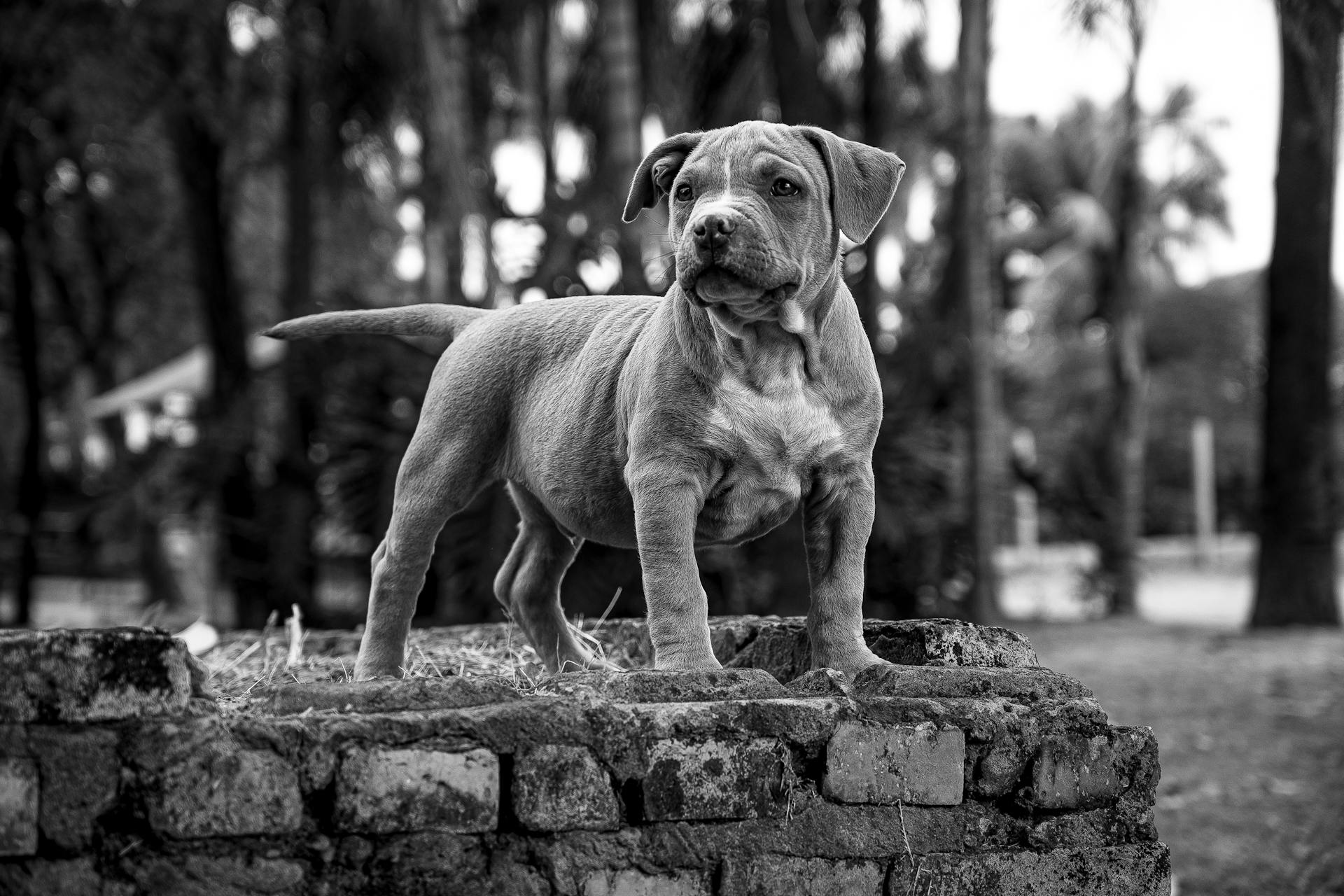
Bully dogs can live up to 10-15 years with proper care and attention.
Genetics play a significant role in determining a bully dog's life span, with some breeds like the English Bulldog living shorter lives than others.
Regular veterinary check-ups can help identify potential health issues early on, such as hip dysplasia and allergies.
A balanced diet that meets a bully dog's nutritional needs is essential for maintaining overall health.
Bully dogs are prone to obesity, so monitoring food intake and ensuring regular exercise is crucial.
With proper care and attention, many bully dogs can live well into their teens.
For your interest: Doberman Pinscher Care
Pit Bull Health Issues
Pit Bulls are prone to various health problems that can affect their lifespan. Without proper care, they may not live as long as they should.
Hip dysplasia is a common issue in Pit Bulls, caused by irregular bone growth that weakens their hip joints, making it harder for them to move. If you notice your adult dog hesitant to move or with a decreased range of motion, hip dysplasia might be the culprit.
Readers also liked: Are Bully Dogs Pit Bulls
Knee dysplasia is another condition that limits your dog's ability to move due to bone atrophy within the knee. Pit Bulls are also prone to experiencing arthritis, making it essential to monitor their strength and mobility.
Thyroid issues can affect Pit Bulls, causing a deficiency in hormone production, leading to signs like weakness, hair loss, sluggish motion, and weight gain. Regular vet checkups can help catch these issues early.
Heart disease is another concern in Pit Bulls, which can be harder to detect through behavior alone. Regular vet visits can help identify signs of heart disease or other cardiovascular conditions.
To prolong your Pit Bull's lifespan, it's crucial to prioritize their health. Here are some common health conditions to be aware of:
Prolonging Lifespan
Prolonging Lifespan is a top priority for any Pit Bull owner. Regular vet checkups are essential to catch any underlying health issues early on, giving your pup a better chance of living a long and healthy life.
Feeding your Pit Bull high-quality, vet-approved dog food is crucial for their overall health. This, combined with exercise portion control, will help them maintain a healthy weight and reduce the risk of obesity-related problems.
Proper dental hygiene is also vital for your Pit Bull's overall health. By observing good dental habits and seeking your vet's guidance, you can help prevent dental issues and keep your pup's teeth and gums healthy.
Regular exercise and mental stimulation are must-haves for a Pit Bull's everyday lifestyle. This will keep them physically and mentally fit, reducing the risk of boredom, stress, and other behavioral problems.
If you're concerned about your Pit Bull's joint health, talk to your vet about joint health supplements. These can be a great way to support their overall joint health and reduce the risk of joint-related problems later in life.
Here are the top 5 tips to prolong your Pit Bull's lifespan:
- Regular vet checkups
- High-quality, vet-approved dog food
- Proper dental hygiene
- Regular exercise and mental stimulation
- Joint health supplements
Pitbull Breeds
Pitbull breeds are known for their short coats, which require minimal grooming and are often low-maintenance.
Some popular Pitbull breeds include the American Pitbull Terrier, American Staffordshire Terrier, and Staffordshire Bull Terrier.
Their compact size, typically weighing between 35-60 pounds, makes them a great fit for city living or small homes.
A different take: Lifespan of Boston Terrier
What Is the Blue Nose Pit Bull?
The Blue Nose Pit Bull is a beautiful and unique breed. They are a variation of the American Pit Bull Terrier, one of the three main types of Pitbull breeds.
Their distinctive blue-gray nose is what sets them apart from other Pitbulls. This trait is a result of a specific genetic variation.
If your Blue Nose Pit Bull is an American Pit Bull Terrier, expect their average lifespan to be between 8 and 15 years.
A fresh viewpoint: Miniature Bull Terrier Life Span
What Is the Red Nose Pit Bull?
The Red Nose Pit Bull is a beautiful breed with a rich history.
They are often referred to as American Pit Bull Terriers, a type of Pitbull breed.
Worth a look: Bully Pit Dog
Their distinctive red nose is a result of their ancestry, which includes the Old English Bulldog.
They can weigh anywhere from 35 to 60 pounds.
A Red Nose Pit Bull's typical lifespan ranges from 8 to 15 years.
With proper care and attention, they can live a long and healthy life.
Their short coats make them relatively low-maintenance when it comes to grooming.
They require regular exercise to stay happy and healthy.
Genes
Genes play a significant role in determining a Pitbull's lifespan. Genetics are probably the most significant factor for Pitbull lifespans.
Looking at a Pitbull's parents and grandparents can give you an idea of their life expectancy. Breeders can provide information about a Pitbull's lineage, but shelter dogs usually don't come with this information.
If you don't have any information about your Pitbull's life expectancy, you can still influence their environmental factors to help them reach their maximum life expectancy.
A different take: Caucasian Shepherd Dog Life Expectancy
American Bulldog Health
American Bulldogs are generally a healthy breed, but they can be prone to certain health issues.
Hip dysplasia is a common problem in American Bulldogs, with some studies showing that up to 30% of the breed may be affected. Hip dysplasia can lead to arthritis and mobility issues if left untreated.
American Bulldogs can also be susceptible to allergies, with some owners reporting skin issues and ear infections.
Heart problems, such as pulmonic stenosis and patent ductus arteriosus, can be a concern in American Bulldogs. These conditions can lead to breathing difficulties and other complications.
Some American Bulldogs may experience eye problems, including cherry eye and entropion. These conditions can cause discomfort and vision loss if left untreated.
Responsible breeding practices can help minimize the risk of these health issues in American Bulldogs.
Health and Nutrition
As a bully dog owner, you have a significant influence on your furry friend's lifespan. One crucial aspect of their health is nutrition, which can either shorten or lengthen their life. A complete and balanced diet is essential for your bully dog's overall well-being.
Feeding your bully dog table scraps is a big no-no, as it can be detrimental to their health. Treats should make up only 10% of their calorie intake and never replace a meal. A diet formulated for large-breed dogs, rich in protein, and low in carbohydrates is ideal for maintaining a muscular build.
To maintain a healthy weight, it's essential to monitor your bully dog's food intake and exercise portion control. You can do this by feeling their sides, where the ribcage is, and checking if you can feel the bones beneath the skin without pressing down. If you're unsure, consult with your veterinarian for personalized advice.
Here's a quick guide to help you choose the right food for your bully dog:
Remember, regular vet checkups, proper dental hygiene, and mental stimulation are also crucial for prolonging your bully dog's lifespan. By following these simple tips, you can help your furry friend live a long, happy, and healthy life.
Nutrition
Providing the right nutrition for your Pitbull is crucial for their overall health and longevity. A complete and balanced diet can have a significant influence on the length of their life. Keeping your Pitbull from becoming overweight will be one of the deciding factors of their lifespan.
Overweight Pitbulls suffer from many health issues not faced by their healthy-weight companions, especially as they age and their joints begin to fail. If you're wondering if your Pitbull is overweight, feel their sides where the ribcage is – their ribs shouldn't stick out or be prominent, but you should be able to feel the bones beneath the skin without pressing down.
To help your Pitbull maintain a healthy weight, it's essential to exercise portion control. Pit Bulls are hearty eaters, and their mighty appetite often puts them at risk of obesity. Feeding high-quality, vet-approved dog food and controlling portions can help prevent excess pounds.
For more insights, see: English Bulldog Weight at 1 Year
Regular exercise and mental stimulation are also vital for your Pitbull's overall health. Make sure to include these in your Pitbull's everyday lifestyle. You can also talk to your vet about joint health supplements that could be beneficial for your Pitbull's joint health.
Here's a quick guide to help you choose the right diet for your Pitbull:
Remember to consult with your vet for personalized advice on choosing the best diet for your Pitbull. If you can't get to a vet in person, consider using online services like PangoVet for affordable and convenient consultations.
Discover more: Vet Dogs Dog Treats
Healthcare
Regular wellness checks are crucial for your Pitbull's health and longevity. These checks can help identify potential health issues early on, such as hip dysplasia, knee dysplasia, and heart disease.
Pitbulls are prone to joint problems, including hip dysplasia, which can weaken their hip joints and make it harder for them to move. If you notice your adult dog hesitating to move or experiencing a decreased range of motion, hip dysplasia may be the culprit.
Knee dysplasia is another common issue, caused by bone atrophy within the knee. This can lead to arthritis and decreased mobility. Your vet can help you catch these issues early and develop a plan to manage them.
Thyroid issues are also common in Pitbulls, where the thyroid gland doesn't produce enough hormones to maintain equilibrium. Signs of thyroid deficiencies may include weakness, hair loss, sluggish motion, and weight gain.
To keep your Pitbull healthy, make sure to feed them high-quality, vet-approved dog food, and exercise portion control to maintain a healthy weight. Regular dental hygiene is also essential, as Pitbulls are prone to dental problems.
Here are some common health issues to look out for in your Pitbull:
- Hip dysplasia
- Knee dysplasia
- Thyroid issues
- Heart disease
Frequent wellness checks can help improve your Pitbull's lifespan, as well as identify potential health issues early on. By being proactive about your Pitbull's health, you can help them live a long and happy life by your side.
Healthy Grooming Habits
Grooming is a crucial part of your pit bull's health and well-being. It's essential to implement a regular grooming session into your weekly routine.
Regular grooming can help you catch any skin irritation or conditions early on. Pit bulls with short coats are prone to skin issues, so keeping an eye out for flaking or rashes is vital.
Brushing your pit bull's coat once a week can help prevent shedding and reduce the risk of allergies and sickness. It's also a great way to bond with your dog.
Filing or clipping long nails is another important part of grooming. Long nails can be painful for your dog and cause discomfort.
Bathing your pit bull when they're visibly dirty is a must. Regular baths can help keep their coat clean and prevent skin issues.
Creating a toothbrushing regimen is also crucial for your pit bull's oral health. Regular brushing can help prevent bad breath and gum disease.
Here are some essential grooming habits to get you started:
- Brush your pit bull's coat once a week
- File or clip long nails
- Bathe your 'bull when visibly dirty
- Create a toothbrushing regimen
Sources
- https://rockykanaka.com/how-long-do-pit-bulls-live-everything-you-should-know-about-the-pit-bulls-lifespan/
- https://www.petmd.com/dog/breeds/american-bulldog
- https://www.petmd.com/dog/care/how-long-do-dogs-live
- https://www.dogster.com/dog-health-care/pitbull-lifespan-how-long-do-they-live
- https://post.bark.co/breeds/how-long-do-pit-bulls-live/
Featured Images: pexels.com


